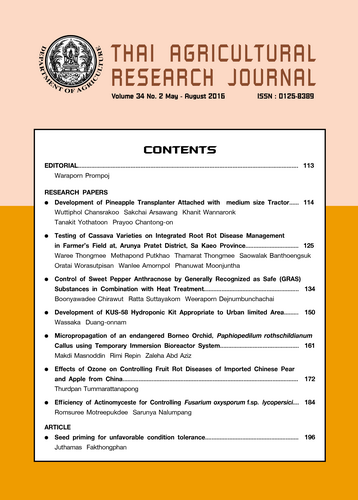Micropropagation of an endangered Borneo Orchid, Paphiopedilum rothschildianum Callus using Temporary Immersion Bioreactor System
DOI:
https://doi.org/10.14456/thaidoa-agres.2016.12Keywords:
Protocorm, Protocorm like bodies (PLB), RITA®, 2, 4-dichlorophenoacetic acid (2, 4-D), 1-phenyl-3-(1, 3-thiadiazol-5-yl)-urea (TDZ)Abstract
This research was aimed to propagate Paphiopedilum rothschildianum through protocorm like bodies (PLBs) induction from callus and shoot regeneration from PLBs using RITA® Temporary Immersion Systems. Callus were induced from seeds and protocorm explants on half-strength semi-solid MS medium supplemented with 0-22.6 M 2,4-dichlorophenoacetic acid (2,4-D) and 4.54 M 1-phenyl-3-(1,2,3-thiadiazol-5-yl)-urea (TDZ). Approximately 0.5 g callus were inoculated in a 1L RITA® vessel containing 150 ml liquid medium with immersion time of 5 min in every 125 min. Different concentrations (15 and 58 mM) of sucrose were evaluated for PLB formation from callus. The explants produced calli as early as 30 days. The percentages of explant forming callus after 90 days of culture were 77.04.5% and 94.411.0% respectively. Callus proliferation using RITA® system showed 3-fold increase in fresh weight (as compared to that cultured on semi-solid) and 135 PLBs per gram calli were regenerated. Regeneration capacity increased to 190 PLBs per gram calli when sucrose concentration in the medium was elevated from 15 mM to 58 mM.Downloads
Published
2016-08-01
How to Cite
Masnoddin, M., Repin, R., & Abd Aziz, Z. (2016). Micropropagation of an endangered Borneo Orchid, Paphiopedilum rothschildianum Callus using Temporary Immersion Bioreactor System. Thai Agricultural Research Journal, 34(2), 161–171. https://doi.org/10.14456/thaidoa-agres.2016.12
Issue
Section
Technical or research paper
License
Copyright (c) 2017 วารสารวิชาการเกษตร (Thai Agricultural Research Journal)

This work is licensed under a Creative Commons Attribution-NonCommercial-NoDerivatives 4.0 International License.
Thai Agricultural Research Journal



